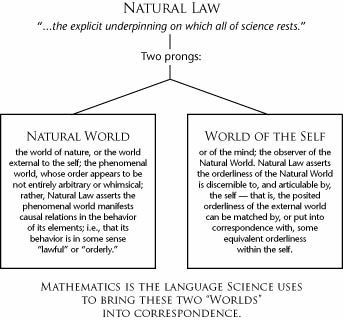Hi djf! Picking up where I left off, RE: the above italics.
Thank you for defining the term "random." You are right: it is a very slippery word that gets tossed around as if everybody could agree on what it means, which they don't. I.e., it means different things to different people. (To me, it is a sort of tacit confession that there is something going on that we don't understand.) So if we are to have a conversation, it helps to know what you mean by that word.
I think you've hit on an interesting insight: "random" refers to experimental results whose outcomes are "non-deterministic" in the sense that they do not depend on the presupposition(s) — conscious or unconscious — of the experimental observer. (Did I get that right?)
It is so very ironic to me: Modern science has expelled final causes from its method, final cause being a purpose or goal which, of course, can only be formed in a being that can think and act. "Scientific" materialism has absolutely no use for goals or purposes in nature: This philosophical doctrine insists that everything that exists is "random" matter in its motions, period. And yet every scientist that tries to make concrete reality "fit" his model is tacitly, if unconsciously, working towards a final cause.
In your original essay/post, djf, you remarked:
Everyone, or at least most, hears about [the] Theory of Everything. It is a model that physicists are trying to put together to explain why things are the way they are and (if possible) what is the meaning.... The one thing that proves is that most physicists are really, really, really bad epistemologists!LOL, I so agree! Except for the part about "meaning": In general, I don't think physicists care much about that. It is a very bad epistemologist, indeed, who can take a concrete observation and universalize it into a "law of nature." The problem here is our ability to observe is so very limited. The current ToE has managed to integrate three of the four fundamental forces of nature, but it cannot fit the fourth, gravity, into its model. The reason for that may be that gravity is an interdimensional phenomenon; and we humans cannot "see" outside "our" dimension....
Anyhoot, your legos are inert, "dead" matter. I gather your point is that dead matter does not bootstrap itself into life; nor does random, inert matter (legos) have any principle in itself that can generate order in nature — patterns and regularities that are evident to any unbiased observer of the world. You suggest that it takes "intent," or "imagination," for something "to be the way it is, and not some other way." Indeed.
But whose imagination or intent? Are we to attribute it to some "God particle," as certain physicists propose? Again, if we are to understand "particle" as a species of "matter," then how does this matter acquire divine attributes such that it is a purposeful, willing, and effective actor in the creation and evolution of the world?
It seems to me that all too often, scientists derive models of the world, and then try to make the world "fit them." But the world will never "reduce" to any man-made model. Which I gather is what William James (an agnostic) was trying to convey to Bertrand Russell (a very hard-core atheist): "Say good-by to mathematical logic if you wish to preserve your relations with concrete realities!"
Which is not to say that mathematics and geometry are useless cosmological tools. I think what James was saying is that mathematical logic is tantamount to calculative processes. Mathematical logic is great for constructing formal systems (scientific theories); but it cannot capture the fullness of reality (as Gödel made clear).
Pythagoras was not interested in mathematical logic; he was interested in number and geometry as revelatory of the essential structure of the Cosmos. Plato was his student. Plato's creation myth — the Timaeus — was (according to the 2nd-century Neoplatonist Numenius) "cribbed wholesale" from Pythagoras. But this would be difficult to prove, since Pythagoras' teachings were conveyed orally — he himself wrote nothing down.
But I digress. I'd really love to get into Plato's creation myth, but I've run on so long by now. Let me just say that it is responsive to the matters we are discussing: How "random" matter is drawn into actualized, living forms.
You asked: "Is life made of matter?" I'll answer that question: NO. Nor is life an epiphenomenon of matter. Nor is consciousness. I'm running out of time here, so maybe we can discuss this further another time.
One thing you said struck me as oh, so true: that we "are mapping the INSIDE (their experiences and knowledge and understanding) to the OUTSIDE (the external world, politics, astronomy, whatever!)." And thus you reveal yourself to have a strong affinity to Natural Law!
Let me draw you a picture of that, as informed by the insights of the late, great mathematician and theoretical biologist, Robert Rosen:
Will close for now — but I hope to hear from you again soon, dear djf! This has been a fascinating conversation, and I thank you for it!
